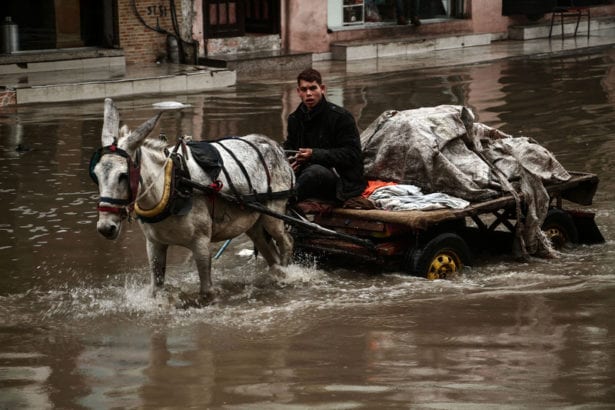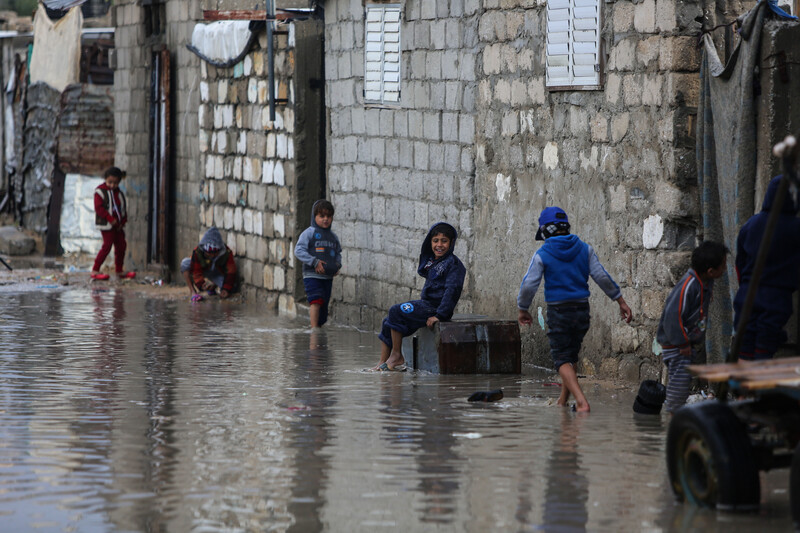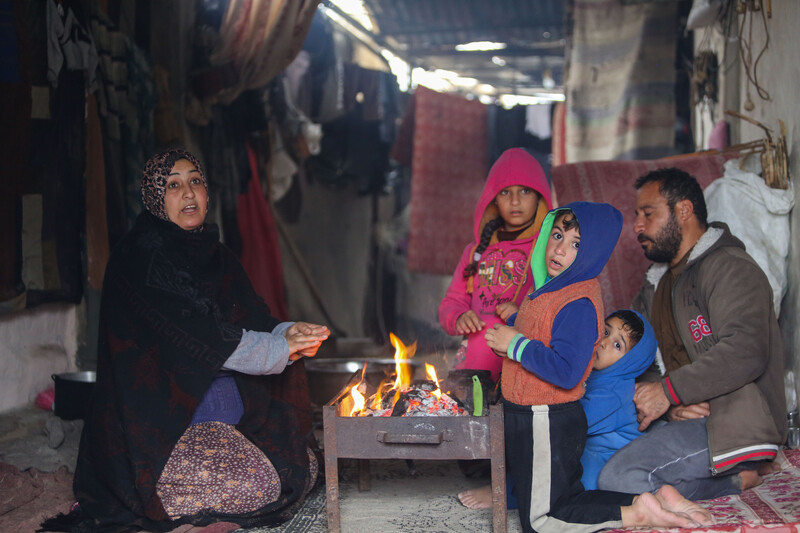
Heavy rains and cold weather have battered Gaza where infrastructure is ill-equipped to deal with extreme weather. (Mohammed SalemAPA images) (EI)
This winter is expected to be even tougher, because of pandemic lockdown restrictions that have forced the closure of many businesses, pushing yet more people into poverty.
By Ola Mousa, reposted from The Electronic Intifada
Winter is falling hard in Gaza.
Heavy rains for the past months since November have led to the flooding of houses and roads, especially in Gaza’s many refugee camps.
In al-Shati (Beach) refugee camp of Gaza City, Baha Hamad, 40, stood surveying the damage caused by rain leaking through his asbestos roof in December.
“I don’t have money to build the kind of walls that will prevent water from leaking inside,” he told The Electronic Intifada.
Hamad’s home also houses his wife and five children, and their predicament is not unique. Many houses in the camp need to be rain-proofed, especially in the areas that overlook the Mediterranean Sea where dwellings are directly exposed to lashing winds and strong rains.
The narrow alleys and roads of the camp also flood easily.
“The camp’s roads have been damaged due to the rains over the past years, and the houses have been affected due to the poor infrastructure,” Hamad said.
Some of this could have been avoided with better drainage. But that is the kind of infrastructure project Palestinians in Gaza cannot undertake because of the 14-year-old Israeli-Egyptian blockade.
Bad year, worse decade
Like everywhere else, 2020 was tough in Gaza. But in this overcrowded, besieged, and impoverished coastal strip of land, lockdowns and the economic and humanitarian pain resulting from the global COVID-19 pandemic have only exacerbated an already desperate situation.
More than half the population already lived under the poverty line. And the economy has suffered dramatically as a result of the Israeli-Egyptian blockade on Gaza and repeated Israeli military operations that, according to the UN, have cost the territory nearly $17 billion dollars in the decade from 2007-2017.
The UN argues that without the blockade and Israel’s military operations, poverty in Gaza could have fallen as low as 15 percent by 2017.


In the Gaza City neighborhood of Sheikh Radwan, Muhammad Radi, 40, spent two nights with rainwater dripping from the roof of his house. He tried to fix the leaks several times but with no success.
He used to bring a special material every year to fix them, and some years he would put up nylon sheets to divert rainwater onto the road.
He can no longer afford such measures. The unemployed former construction worker sometimes cannot secure food for his four children.
“This year is tough on us all. I spend all the time thinking about how to secure food for my four children, but I have been unemployed for three years,” Radi told The Electronic Intifada. “I only receive food parcels from UNRWA every two or three months.”
UNRWA is the UN body that cares for Palestinian refugees.
During winter, Radi continued, camp residents would normally go out to collect firewood to keep their asbestos-riddled, leaky homes warm, but pandemic restrictions have left them unable even to do that.
“This winter is harsh on us,” Radi said. “From the start, my house was not fit for human habitation. Now, it is too cold for even animals to bear.”
RELATED READING:
- Chronic malnutrition in Gaza blamed on Israel
- Study says attacks on infrastructure in Gaza and West Bank exact human cost
- Gaza incendiary balloons are ‘distress signals’ against Israel’s cruel blockade
- Understanding the Crisis in Gaza
- Israeli airstrikes vs Palestinian rockets: Facts & Stats on air attacks



